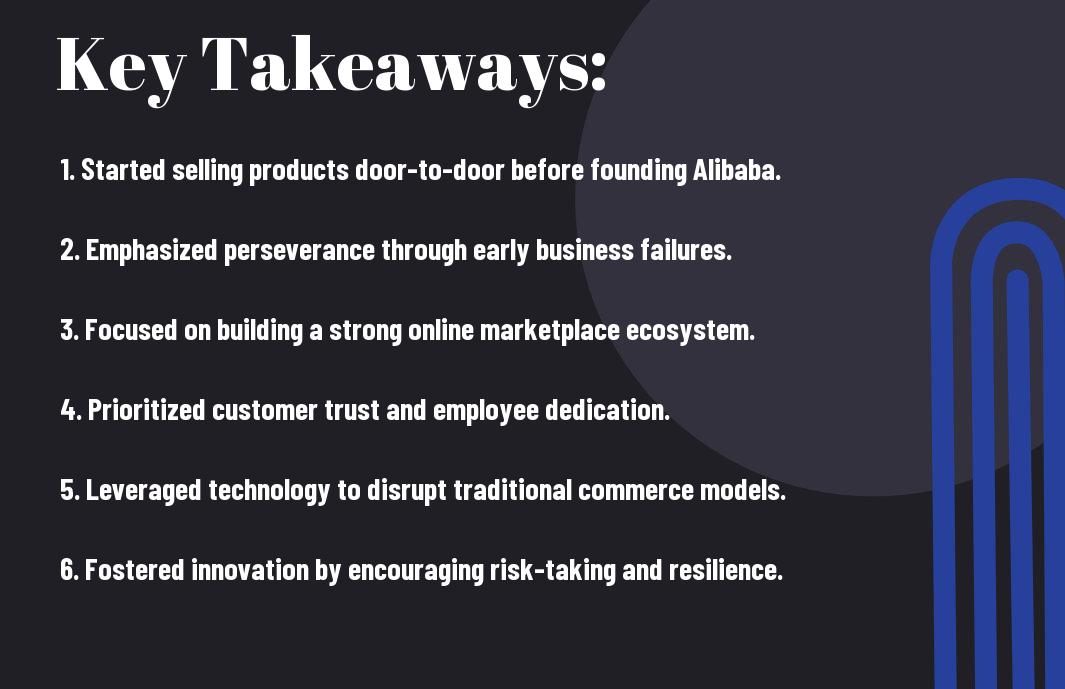Jack Ma’s journey from door-to-door sales to becoming a tech giant is nothing short of inspiring. You might wonder how someone with humble beginnings could build a multi-billion dollar empire. In this blog post, you’ll uncover the key strategies and lessons from his remarkable playbook that can help you navigate your own entrepreneurial path. Whether it’s the importance of resilience, embracing technology, or understanding customer needs, Jack’s experiences offer valuable insights to empower your success.
Key Takeaways:
- Jack Ma’s journey from humble beginnings to a tech titan illustrates the importance of resilience and adaptability in business.
- His focus on building a customer-first approach helped Alibaba to prioritize consumer needs, leading to substantial growth.
- Emphasizing collaboration over competition, Ma built strategic partnerships that enhanced Alibaba’s ecosystem.
- Innovative thinking and a willingness to embrace technology played a pivotal role in transforming Alibaba into an e-commerce powerhouse.
- Ma’s leadership style emphasizes the value of a strong team, empowerment, and fostering a supportive work environment to achieve organizational goals.
The Humble Beginnings of Jack Ma
From English Teacher to Entrepreneur
Transitioning from an English teacher to an entrepreneur, Jack Ma recognized his passion for connecting people through technology. Despite numerous rejections—over 30 job applications went unanswered—his determination never wavered. You can draw inspiration from his journey, as he transformed failures into wisdom, believing that the best opportunities are often disguised as challenges.
The Birth of Alibaba: A Risky Leap of Faith
In 1999, fueled by a vision to revolutionize the business landscape, Jack Ma co-founded Alibaba from his apartment in Hangzhou, China. He launched on this venture despite a lack of funds and heavy skepticism from the industry. Yet, his unwavering belief in the potential of the internet led him to take a gigantic leap of faith.
This initial step was not without risks. Jack gathered a team of 18 friends and dedicated long hours to develop Alibaba’s platform, determined to provide small businesses with access to global markets. He invested his life savings of about $60,000 and faced countless obstacles, including intense competition and technological barriers. However, Ma’s resilience shone through, as he navigated the uncertain waters of startup life, ultimately laying the foundation for a billion-dollar empire. His story reflects the essence of entrepreneurship—embracing risk and uncertainty, fueled by a vision to create something remarkable. You can always find inspiration in Jack Ma’s willingness to pursue what others deemed impossible.

The Art of Resilience: Overcoming Early Setbacks
Facing Rejection: Lessons from Investors
Countless investors turned Jack Ma away, but each rejection reinforced his determination. With more than 30 venture capitalists saying no, he didn’t see this as failure but rather as an opportunity to refine his vision. You should take heed of Ma’s approach—using feedback to improve your pitch and keeping your passion alive during tough times can transform rejections into stepping stones toward success.
Building a Team: Finding the Right Partners
Jack Ma knew that one person alone couldn’t accomplish his grand vision. He actively sought out partners who not only shared his passion but also brought diverse skills to the table. Finding the right individuals isn’t just about expertise; it’s about building chemistry and fostering a shared ambition. By surrounding yourself with a solid team, you create a foundation that can withstand challenges and propel your business forward.
In the early days, Ma handpicked his co-founders, seeking those who complemented his strengths and filled the gaps in his skill set. For instance, his partnership with Joe Tsai brought legal and financial expertise that Ma lacked. This collaboration allowed Alibaba to navigate regulatory hurdles effectively. You can apply this lesson by valuing collaboration and creating a team that balances creativity with operational proficiency. Together, these relationships cultivated a sense of shared responsibility and vision that became vital in overcoming obstacles in Alibaba’s early years.
Crafting a Vision: The Alibaba Ecosystem
Understanding E-commerce: Ma’s Unique Approach
Jack Ma’s vision for e-commerce transformed online shopping into a vibrant marketplace. He emphasized connecting small businesses with consumers directly, creating opportunities where none existed. By focusing on user experience and harnessing data analytics, Ma crafted a platform that catered to diverse consumer needs. His emphasis on community engagement and trust helped build a loyal customer base that thrived on the excitement of online transactions.
Expanding Beyond Retail: Payments, Cloud, and Entertainment
Ma did not stop at retail; he recognized the interconnectedness of various sectors. Alibaba’s expansion into payment solutions with Alipay, cloud computing with Alibaba Cloud, and digital entertainment with Youku demonstrates a holistic approach to building an ecosystem that supports each segment. Each business complements the others, creating a seamless experience for users.
The integration of these services laid the groundwork for a comprehensive ecosystem. With Alipay, you can effortlessly transact while shopping on Taobao, ensuring a secure and efficient payment process. Alibaba Cloud provides the backbone for countless companies, enhancing their digital capabilities and enabling them to innovate. In entertainment, Youku has become a major player, offering streaming services that capture audiences, blending commerce and enjoyment. This multifaceted strategy not only boosts revenue streams but also reinforces customer loyalty, enabling Alibaba to dominate the market landscape.
Disrupting Traditional Business Models
Leveraging Technology for Competitive Advantage
Innovative use of technology has allowed Alibaba to capture the market in ways traditional businesses couldn’t. By embracing big data analytics and AI, you can better understand customer behavior, adjusting your offerings in real-time to maximize engagement and sales. With over 800 million users, Alibaba utilizes these insights to create personalized shopping experiences that keep customers coming back.
Redefining Customer Engagement through Innovation
Engaging your customers has transformed radically in the digital age, largely thanks to Alibaba’s strategies. By implementing features such as live streaming sales events and social shopping, you’re enabling customers to interact with products in more immersive ways. These innovative approaches have proven exceptionally effective, increasing user engagement and creating a sense of community around your brand.
For instance, Alibaba’s Taobao Live has successfully blurred the lines between shopping and entertainment, allowing influencers to showcase products directly to potential buyers. During a single event in 2020, they generated sales of over $7 billion in just 24 hours. By leveraging similar tactics, you can redefine your own customer engagement, turning buyers into loyal advocates who want to share and promote your brand across their own networks.
Navigating Regulatory Challenges: A Balancing Act
Build Relationships with Government Entities
Investing time in establishing strong relationships with government officials can pay off significantly. You’ll find that open communication fosters trust, which can lead to smoother negotiations and better regulatory outcomes. Jack Ma’s approach involved regular dialogue with policymakers, ensuring that Alibaba’s interests were understood while also demonstrating a commitment to compliance and social responsibility. Building these connections is important for navigating the complexities of local regulations.
Complying with Local Laws while Pursuing Growth
Pursuing growth in a rapidly evolving market necessitates an acute awareness of local regulations. Striking a balance between compliance and expansion can often seem daunting. Your business strategy should prioritize proactive engagement with local authorities to stay ahead of regulatory changes while maintaining the flexibility to adapt operations as needed.
For Alibaba, this meant hiring local experts familiar with regional laws, which enabled the company to tailor its offerings while navigating the intricate landscape of compliance. For instance, launching Alipay required understanding complex financial regulations in various countries. By collaborating with local financial experts and regulatory bodies, Alibaba not only expanded its market reach but also enhanced trust and credibility among users. This strategy exemplifies how aligning your growth ambitions with regulatory requirements can lead to sustainable success.
Fostering Innovation and Culture within Alibaba
Emphasizing a ‘Customer First’ Philosophy
At Alibaba, a fundamental belief drives every decision: put the customer first. This philosophy shapes product development, services, and policies, ensuring that every innovation is designed with your needs in mind. By actively seeking customer feedback and engaging in dialogue, the company continuously adapts its offerings, creating a tailor-made experience that keeps users returning time and again.
Developing Talent through Continuous Learning
Continuous learning stands as a pillar of Alibaba’s corporate culture, encouraging you to expand your skills and knowledge at every stage of your career. The company promotes initiatives like workshops, online courses, and mentorship programs, all aimed at fostering personal and professional growth. This commitment not only enhances your capabilities but also fuels the company’s ongoing innovation and success.
By investing heavily in employee development, Alibaba creates a dynamic workplace where curiosity meets opportunity. You’ll find yourself benefiting from structured training while also being encouraged to explore uncharted territories within your roles. Like the famed “Alibaba University,” the company exemplifies its dedication to lifelong learning by equipping you with the tools to navigate an ever-evolving marketplace. In this environment, your growth directly translates into organizational success, driving creativity and ensuring that Alibaba remains at the forefront of industry trends.
The Power of Strategic Partnerships and Global Expansion
Collaborating with International Giants
Jack Ma understood the value of collaboration, forming strategic partnerships with global leaders to drive Alibaba’s growth. By aligning with major corporations like Starbucks and Yahoo!, you not only gain access to their resources but also leverage their market reach. These collaborations have allowed Alibaba to diversify its services and enhance its competitive edge across various sectors.
Bridging Cultural Differences for Market Success
Understanding cultural nuances can lead to remarkable business success. Jack Ma has emphasized that while you may have a great product or service, if it doesn’t resonate with local customs and habits, it could fall flat. Alibaba invested in local market research, adapting its offerings to fit regional preferences and consumer behavior, ultimately ensuring their services were relatable and accessible.
Navigating cultural differences can often mean the difference between success and failure. For instance, when entering the Southeast Asian market, Alibaba recognized that online shopping behaviors were influenced by local festivals, payment methods, and customer service expectations. By tailoring promotions to align with significant cultural events and offering localized payment options like e-wallets, you enhance customer trust and engagement, leading to impressive market penetration and sustained growth.
Jack Ma’s Leadership Philosophy: Lessons for Future Leaders
Embracing Change and Adaptability
Jack Ma’s journey epitomizes the idea of adaptability; his ability to pivot Alibaba’s strategy in response to emerging trends has been a cornerstone of the company’s success. With the landscape of e-commerce constantly evolving, you’ll find it necessary to stay flexible and open to new ideas. Ma encourages a culture that celebrates experimentation, pushing you to learn from failures and embrace the lessons they bring rather than fearing them.
The Importance of Visionary Thinking
The vision behind Alibaba traces back to Ma’s ability to see potential where others saw obstacles. This visionary thinking is not just about dreaming big; it’s about establishing a clear direction for your team. By articulating a compelling narrative, you inspire those around you to contribute toward a common goal. In Alibaba’s case, Ma’s foresight of a digitally connected world fueled their strategies, driving sustained growth even amid fierce competition.
This foresight allows leaders to anticipate market shifts and prepare accordingly. For instance, while many companies were hesitant about entering the mobile payment space, Ma recognized the growing trend and swiftly adapted Alibaba’s offerings to include Alipay. This not only positioned Alibaba as a leader in financial services but also opened new revenue streams. By promoting a culture of visionary thinking, you empower your organization to innovate continuously, ensuring you remain relevant in a rapidly changing environment.
Final Words
Summing up, Jack Ma’s journey from door-to-door sales to building a tech giant offers invaluable lessons for you. His tenacity, vision, and ability to embrace change are qualities that can inspire your own path. Embrace challenges and stay adaptable, as Ma did, and you’ll find creative solutions that can lead you to success. So, take these insights to heart as you navigate your personal and professional journey, and let them motivate you to pursue your dreams with passion and resilience.
FAQ
Q: What is the central theme of ‘From Door-to-Door to Tech Giant – Jack Ma’s Playbook’?
A: The central theme of the book revolves around Jack Ma’s journey from humble beginnings, selling door-to-door, to establishing Alibaba as a leading tech giant in the global market. It highlights his entrepreneurial mindset, innovative strategies, and resilience in overcoming challenges along the way.
Q: What key strategies did Jack Ma employ to grow Alibaba?
A: Jack Ma utilized several key strategies, including building a strong company culture focused on customer service, leveraging technology to enhance business operations, creating a comprehensive ecosystem through various platforms, and continuously adapting to market changes. His vision for long-term sustainability and investment in team building also played significant roles in Alibaba’s growth.
Q: How did Jack Ma’s background influence his business philosophy?
A: Jack Ma’s background as an English teacher and his experiences in the early days of the internet shaped his business philosophy significantly. His emphasis on learning, communication, and understanding customer needs stems from his educational roots. Additionally, his early experiences with failure and rejection instilled a belief in resilience and the importance of embracing challenges.
Q: What are some key lessons entrepreneurs can learn from Jack Ma’s journey?
A: Entrepreneurs can learn numerous lessons from Jack Ma’s journey, including the importance of perseverance, the need to be adaptable in the face of changing markets, and the value of building a strong team. Moreover, focusing on customer satisfaction and innovation can drive business success, as can a clear vision and the willingness to take calculated risks.
Q: In what ways has Jack Ma impacted the global tech landscape?
A: Jack Ma has significantly influenced the global tech landscape through his pioneering work with Alibaba, which transformed e-commerce, logistics, and cloud computing. His innovative ideas and practices have set new standards in the industry, inspired many entrepreneurs worldwide, and contributed to the rise of digital ecosystems across various sectors, making him a key figure in shaping the future of business and technology.








0 Comments